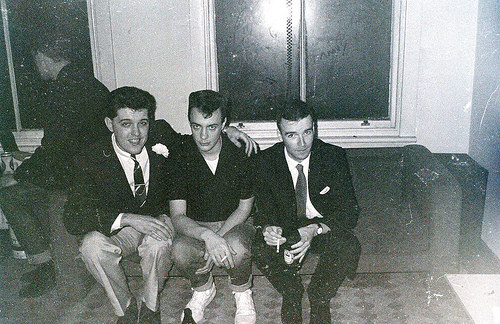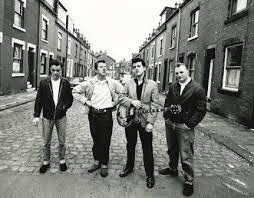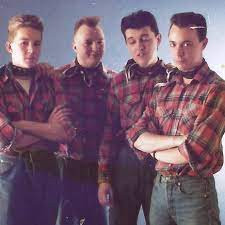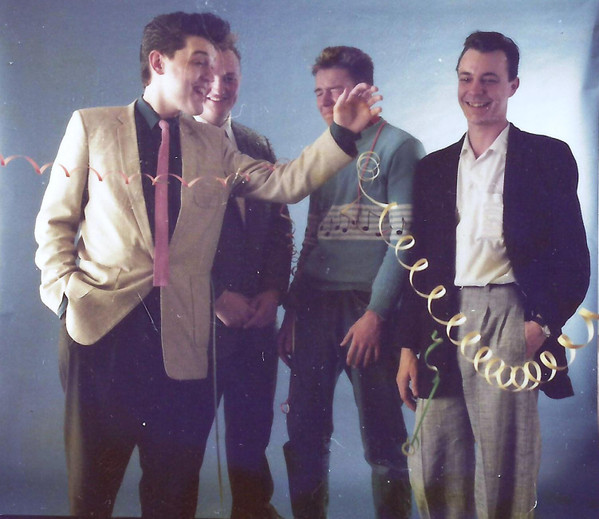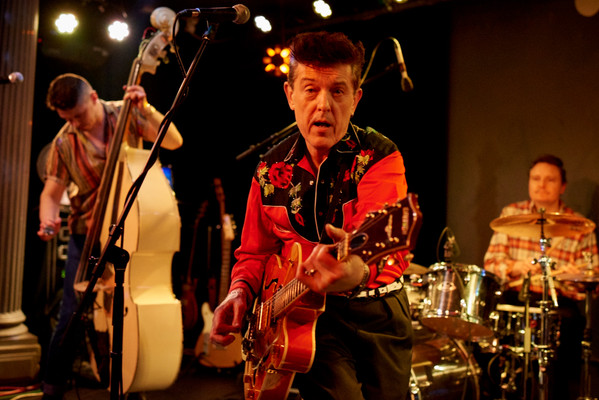Pink Peg Slax
Настоящее имя: Pink Peg Slax
Об исполнителе:
Rockabilly band from Leeds Pink Peg Slax were never your typical rockabilly combo. Instinctively avoiding the "rocking" club circuit and with their records properly filed in HMV and Virgin under "P", the Slax had cut their teeth in seminal punk act The Mekons and early on supported Malcolm McClaren's Bow Wow Wow. Grinning broadly while the rest of Goth Leeds scowled miserably, these Leeds University graduates wrote songs simultaneously nonsensical and literate in a musical setting John Peel called "plangent Cajun-tinged jiveabilly". "If Elvis had been a Marx brother, he would have created Pink Peg Slax", declared James Brown in NME. Boozy chef Keith Floyd wrote "You don't need an oven when you're cooking like Pink Peg Slax". Marc Almond said "play on this B-side for a hundred quid" and Tim "Chet" Strafford Taylor duly obliged. Record companies and the music press were puzzled by the band's unwillingness to play the game and their need to take the piss out of everything. In spite of this their two 7" singles, EP and two albums received excellent reviews and they recorded four BBC Radio One sessions (three for Peel) and gigged extensively in the UK and Europe before falling apart in 1990 as Dance Music took hold everywhere. Mark Wilson (vocals and rhythm guitar), Pete Barker (lead guitar), Tim Strafford-Taylor (bass) and Mekon John Langford (drums) had formed a band for a one-off Leeds University Summer Ball gig in May 1980. Bored with what New Wave band was becoming and taking their name from Cochran's trouser-based chanson “Pink-Peg Slacks”, they grabbed the £80 on offer. They gained instant notoriety from that first ball-gig and were banned from the campus following a far-too-relaxed performance supporting glamsters Mud. After several gigs at the Student's Union, Cosmo's in Chapeltown, Leeds Warehouse and Leeds Poly (where they supported Rocky Sharpe And The Replays), they recorded their first John Peel session as members of The Mekons' December 1980 line-up, Mark providing the tune and singing the rockabilly song The East Is Red with Pete on bass, the Meeks' John Langford on drums and session producer Bob Sergeant on piano. As a Mekons song, Peel fairly bridled at it, but he later grew to love the big-mouthed students playing rockabilly. Broadcasting House security that night were relieved to see the back of the "Teddy Lads" (as were the Two Ronnies in the BBC bar), but they were to return a few years later, wiser and relatively less incontinent. After Pete Barker left in 1982 to pursue a career as an architect, Tim bought a double bass, Mark switched to lead guitar and they recruited rock and roll wildman Ant Hanlon on drum (later, drum and cymbal and eventually, drums). Martin Foakes joined in 1983 and brought along violin, piano, mandolin and accordion. Pink Peg Slax eventually chose a musical format that was part camp pastiche and part dedicated homage to Sun Session country and rockabilly, with Cajun fiddle and Hank Williams regret poking its nose in. Though they threw in Elvis favourites in the live shows (during several of which they shared the bill and stage with John Peel), the songs were studded with literary references and the trinity of Slax obsessions: death, decay and the consequences of sin. Pete Barker and Mark Wilson were enthusiasts of the macabre tales of M.R. James, Guy De Maupassant and the early work of David Lynch and two early unreleased songs "Rotting Robin" and "Cigarette Stub" (about child-murder and amputation respectively) were miles away from the girls'n'cars'n'clothes lyrical canon their trouser-named band would otherwise have suggested. The songs were populated by bizarre characters like deaf railwaymen (Wally, Can You Hear Me?), drunken pigs (Porky Pig), French serial-killers (Old Pierre) and spoofs inspired by early William M Gaine "Mad" magazine R'n'R satire (Bippo, Bippo, Bop Man, Bop; 12 Songs Never Recorded by FRANK SINATRA). Running through the lyrics (and their lives) was booze and its scarring consequences (Scarred Love, Liquid Paradise). They should have, but never did, moved to London: they were fiercely proud of their adopted city and scorned the career-boosting attractions of the metropolis (Boy From Leeds). Ever-earlier daytime Radio One airplay in 1986 seemed to presage fame and fortune, but perhaps the whole thing was too knowing and too much of an in-joke for commercial success. Record companies certainly didn't know what to make of it and the band sold few records. Deliberately antagonising the Indie Scene by being rockabillies, and the Rockabilly Scene by being Indie, was surely a one-way ticket to Palookaville.
